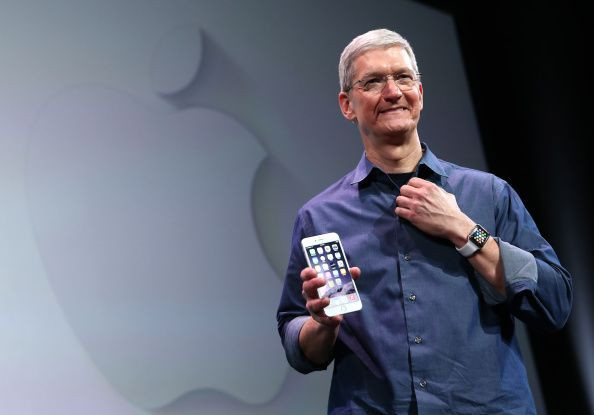If Diversity Is So Important To Apple, Why Aren't They Showing It?

Of all the tech companies' so-called “diversity reports” over the past year, Apple’s seemed the most impassioned and sincere. The company produced a glossy website for its diversity efforts with a moving video and a commitment from the top. “As CEO, I’m not satisfied with the numbers on this page,” Tim Cook said in a statement. “They’re not new to us, and we’ve been working hard to improve them.”
It’s all the more striking that a month later, as thousands in the room and millions around the globe looked on, Apple relied on its tried and true white and male top executives to roll out the iPhone 6 and Apple Watch. Granted, it’s only been a month, but as Cook said the numbers are “not new to us,” so it is fair to ask, why would Apple make so little effort to manage the optics of diversity, if not the reality? As Twitter roundly noticed, even the entertainment -- U2 -- was old white men.
I noted all this in passing in a piece on Apple’s big reveal, which by nearly all accounts, including mine, went incredibly well for Apple and for Tim Cook. I also said that if diversity was Apple’s biggest challenge, there would be “smooth sailing ahead.” That was a bad choice of words -- since changed -- and prompted a reaction from longtime PR exec and friend Michele Clarke, who wrote me on Facebook, “You totally had me until the kicker. If that’s the case, why wasn’t this stage any different?”
She was exactly right; there really is no excuse, and Apple’s lack of any sort of visible effort make their statements on the issue ring hollow. As Cook said, Apple did not just wake up in August and figure out it had a diversity problem. This is a long-standing issue at Apple and around Silicon Valley, and while there’s no easy fix, making a statement in the keynote would have told the world Apple is at least serious about trying.
The keynote itself is a tightly scripted, choreographed and rehearsed exercise, not an investor conference or impromptu Q&A. It's an ideal time to introduce a new face, ideally one that would better represent Apple's employees and customer base. Since there wasn't one, one has to assume the event was planned to be diversity-free or deemed too critical to risk any departure from the status quo of Cook, Phil Schiller, Eddie Cue and Jony Ive. Apple said last month its workforce is 30 percent female. At the very least, if you’re playing the odds, one of Apple’s presenters on Tuesday should have been female. Why weren’t they?
“I’m not sure who Apple was trying to represent with that performance,” said former White House Director of Online Engagement Sarah Bernard, now an Internet executive. “Diversity on stage would not have distracted in any way from the product focus of the event, but without it, they have a distraction.”
“On a personal note,” she said, “the lack of diversity made me sad.”
Apple has been publicly loading its bench with excellent female execs like Angela Ahrendts, who joined from Burberry on May 1 as senior VP of retail; former U.S. Environmental Protection Agency Administrator Lisa Jackson, who joined in 2013, and BlackRock founder Susan L. Wagner, who was named to the board in July. Ahrendts is new and the others not involved in product, so unlikely they’d take a role in an Apple product launch antime soon.
Apple’s diversity numbers aren’t significant degrees of dismal over any other tech-based Silicon Valley company, but they’re doing a worse job promoting female leaders (I’ll leave race out of this argument for the moment) than Facebook (Sheryl Sandberg), Google (Susan Wojkicki), or of course Yahoo, which is run today by Marissa Mayer but has a long history of female C-level leadership.
There’s no reason Apple can’t take the lead on this issue and put into practice the values in this video. All they have to do is decide to try. I hope they do before my daughter, who loves math and science, watches an Apple keynote.
© Copyright IBTimes 2024. All rights reserved.






















